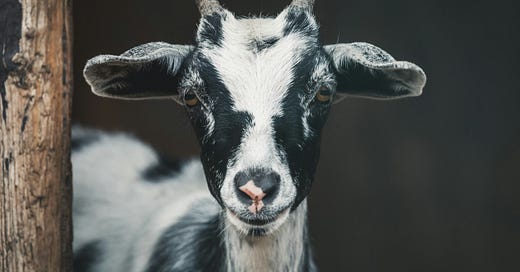All I wanted was to shut my brain off for a couple of hours. An escape from the world, from my life. And what’s the best way to do that? Jump into someone else’s life! So I turned on a movie. Slow and meandering, that’s what I needed. No thrilling chase scenes or wild plot twists, just something simple and easy to follow without paying too much attention.
The film I chose was The Devil’s Bath, a two-hour Austrian period piece about a newlywed woman’s gradual descent into madness as her marriage proves less happy than she’d hoped. But in my haste to escape the modern world, I forgot how often historical films depict animal (ab)use. As such, I wasn’t expecting the level of animal cruelty this film had.
As I watched, my hands itched to press pause, not to escape the abuse but to document it. Because if I didn’t, then who would? Someone must write this down, acknowledge the horrors unfolding before my eyes. How many other people watched this film? How many eyes gazed, unperturbed, upon the bleeding carcasses, upon the fishes’ mouths gaping wide in search of water that would never come, upon the hen forced to sit in the dirt like a busted piñata as merry men whacked a stick at her until her head flew off, upon the moth who was eaten alive? Was I the only one disturbed more by this violence, so banal and quaint, than by the violence inflicted on the human characters?
I don’t know how many live animals were used in this film. I don’t know how much of the cruelty I saw was just special effects. My brain told me I had to research it, I had to learn as much as I could so the animals’ pain wouldn’t be forgotten. I had to look up the filmmakers, to see if they had anything to say about their use of animals. Were they trying to offer commentary on how we so often overlook the mundane suffering animals face every day? Would my rudimentary German be good enough to translate what they said? (No.) What are the animal welfare laws in Austria? Are there exceptions for the entertainment industry? Does it differ for fishes, for insects, for goats? I had to go back and rewatch what happened, take notes of every moment of abuse. I started drafting what I’d write in my head, deliberating what angle I’d take to talk about the horrors I’d seen this time.
Stop.
You have to stop.
My brain became so cluttered with thoughts that I could hardly focus on the movie. Though I wanted to stop at each injustice an animal faced, I didn’t. I didn’t take notes. I didn’t go back and rewatch to ensure I wrote accurately about exactly what happened. So I sat back and watched it happen, reminding myself that no amount of research I did would change anything.
I can’t stop my life every time I’m blindsided by animal cruelty. There will always be more. And I’ll keep on documenting it because it’s a calling as deep within me as veganism. But not this time. Today I rest.
On my mind: Vystopia by Clare Mann
Vystopia = “the anguish of being vegan in a non-vegan world”
If you’ve ever felt overwhelmed by injustice, this is the book to read.





I know. Films are so full of cruelty, and the one thing that's even more painful is how many people fail to even notice.